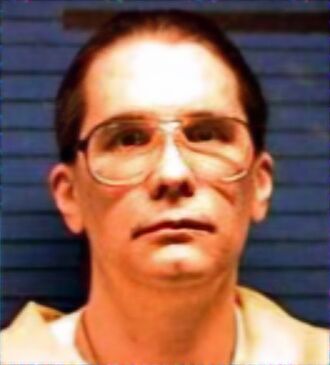Michael Bruce Ross
|
Michael Bruce Ross (July 26, 1959 - May 13, 2005) was an American serial killer. He was executed by lethal injection in the state of Connecticut, which was the first execution in all of New England since 1960.
Biography[edit]
Michael Ross was born on July 26, 1959, to Daniel and Pat Ross in Brooklyn, Connecticut. According to court records, the two married after Pat had discovered she was pregnant. The marriage was not a happy one. Pat hated farm life, and after having four children and two abortions, she ran off to North Carolina to be with another man. When she returned home, she was institutionalized. The admitting doctor wrote that Pat talked of suicide and of beating and striking her children.
Michael Ross' sister has said that as a child, Ross took the brunt of his mother's anger. It is also suspected that an uncle of Ross' who committed suicide may have sexually molested Ross while babysitting him. Ross said he remembered very little about his childhood abuse although he never forgot how much he loved helping his father around the farm.
After his uncle had committed suicide, the job of killing sick and malformed chickens became eight-year-old Michael's responsibility. He would strangle the chickens with his hands. As Michael got older, more of the farm responsibilities became his, and by the time he was in high school, his father depended a lot on Ross' help. Michael loved farm life and met his responsibilities while also attending high school. With a high IQ of 122, balancing school with farm life was manageable. By this time, Ross was exhibiting antisocial behavior, including stalking young teenage girls.
In 1977, Ross entered Cornell University and studied agricultural economics. He began dating a woman who was in ROTC and dreamed of someday marrying her. When the woman became pregnant and had an abortion, the relationship began to falter. After she had decided to signup for a four-year service commitment, the relationship ended. In retrospect, Ross said as the relationship became more troubled he began to have fantasies that were sexually violent. By his sophomore year, he was stalking women.
In his senior year at college, despite being engaged to another woman, Ross' fantasies were consuming him, and he committed his first rape. In that same year, he also committed his first rape and murder by strangulation. Ross said afterward he hated himself for what he did and tried to commit suicide, but lacked the ability to do it and instead promised himself he would never hurt anyone again. However, between 1981 and 1984, while working as an insurance salesman, Ross had raped and killed eight young women, the oldest being 25.
Michael Malchik was assigned chief investigator after the murder of Wendy Baribeault in 1984. Witnesses provided Malchik with both the description of the car -- a blue Toyota -- and the person who they believed kidnapped Wendy. Malchik began the process of interviewing a list of blue Toyota owners which brought him to Michael Ross. Malchik testified that during their initial meeting, Ross enticed him to ask more questions by dropping subtle hints that he was their man.
By now, Ross was living in Jewett City as an insurance salesman. His parents had divorced and sold the farm. During the interview with Malchik, Ross told of his past two arrests on sex offenses. It was at this point Malchik decided to bring him to the station for questioning. At the station, the two talked like old friends: discussing family, girlfriends, and life in general. By the conclusion of the interrogation, Ross confessed to the kidnapping, rape, and murder of eight young women.
In 1987, Ross was convicted of the murders of four of the eight women he confessed to having killed. It took the jury 86 minutes of deliberations to convict him and only four hours to decide on his punishment -- death.
During the next 18 years that he spent on death row, Ross met Susan Powers, from Oklahoma, and the two were engaged to be married. She ended the relationship in 2003 but continued to visit Ross up until his death.
Ross became a devout Catholic while in prison and would pray the rosary daily. He was also accomplished at translating Braille and helping troubled inmates.
In the final year of his life, Ross, who had always been opposed to the death penalty, said he no longer objected to his own execution. According to Cornell graduate Kathryn Yeager. Ross believed that he had been "forgiven by God" and that he would be going to "a better place" once he was executed. She also said that Ross did not wish for the victims' families to suffer any more pain.
Having waived his right to appeal, Michael Ross was scheduled to be executed on January 26, 2005, but an hour before the execution was to take place, his lawyer obtained a two-day stay of execution on behalf of Ross' father. The execution was rescheduled for January 29, 2005, but early in the day was postponed again as a question into Ross' mental capabilities came into play. His lawyer said Ross was incapable of waiving appeals and that he was suffering from death row syndrome.
Ross was executed by lethal injection on May 13, 2005, at 2:25 a.m., at Osborn Correctional Institution in Somers, Connecticut. His remains were buried at the Benedictine Grange Cemetery in Redding, Connecticut.
